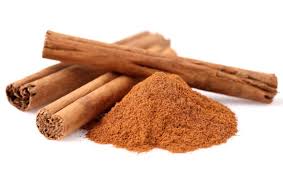揭开肉桂的神秘面纱 南小鹿2020-05-22 00:47:27
六)揭开肉桂的神秘面纱
《圣经》中有几处提到了肉桂(Cinnamon):

《出埃及记》第30篇 (Exodus 30):
耶和华吩咐摩西说: “你要取上等的香料,就是五百舍客勒流质的没药、二百五十香肉桂、二百五十香菖蒲, 和五百桂皮,都按照圣所的舍客勒;再取一欣橄榄油, 以做香的方法调和制成圣膏油,它就成为圣膏油。 要用这膏油抹会幕和法柜, 供桌和供桌的一切器具,灯台和灯台的器具,以及香坛、燔祭坛和坛的一切器具,洗濯盆和盆座。 你要使这些分别为圣,成为至圣;凡触摸它们的都成为圣。”
(Then the LORD said to Moses, “Take the following fine spices: 500 shekels of liquid myrrh, half as much (that is, 250 shekels) of fragrant cinnamon, 250 shekels of fragrant calamus, 500 shekels of cassia—all according to the sanctuary shekel—and a hin of olive oil. Make these into a sacred anointing oil, a fragrant blend, the work of a perfumer. It will be the sacred anointing oil. Then use it to anoint the tent of meeting, the ark of the covenant law, the table and all its articles, the lampstand and its accessories, the altar of incense, the altar of burnt offering and all its utensils, and the basin with its stand. You shall consecrate them so they will be most holy, and whatever touches them will be holy.)
这些上等的香料全都是从远方进口到埃及的,非常昂贵。宝贵的香料碾碎成粉末状后,才能溢出香气,说明基督教徒要经历痛苦的考验,才能流出生命里的馨香。圣膏油象征着圣灵,圣膏油抹了人,代表神得着了人;抹了物,代表神得着了器皿。每一个重生得救的信徒都接受了圣灵的膏抹,成为圣,被神得着来事奉祂。
《箴言》第七篇(Proverbs 7 ):
“看哪,有一个妇人来迎接他,是妓女的打扮,有诡诈的心思。
这妇人喧嚷,不守约束,在家里停不住脚,
有时在街市上,有时在宽阔处,或在各巷口蹲伏,
拉住那少年人,与他亲嘴,脸无羞耻对他说:
平安祭在我这里,今日才还了我所许的愿。
因此,我出来迎接你,恳切求见你的面,恰巧遇见了你。
我已经用绣花毯子和埃及线织的花纹布铺了我的床。
我又用没药、沉香、桂皮熏了我的榻。
你来,我们可以饱享爱情,直到早晨;我们可以彼此亲爱欢乐。
因为我丈夫不在家,出门行远路;
他手拿银囊,必到月望才回家。”
(Then out came a woman to meet him,
dressed like a prostitute and with crafty intent.
She is unruly and defiant,
her feet never stay at home;
now in the street, now in the squares,
at every corner she lurks.)
She took hold of him and kissed him
and with a brazen face she said:
“Today I fulfilled my vows,
and I have food from my fellowship offering at home.
So I came out to meet you;
I looked for you and have found you!
I have covered my bed
with colored linens from Egypt.
I have perfumed my bed
with myrrh, aloes and cinnamon.
Come, let’s drink deeply of love till morning;
let’s enjoy ourselves with love!
My husband is not at home;
he has gone on a long journey.
He took his purse filled with money
and will not be home till full moon.”
神在这里劝勉所有的年轻人,当诱惑和邪恶第一次来纠缠时,应该立即驱除,避免走上受试探的道路。
《雅歌》第4篇 (Song of Solomon 4)
“我妹子,我新妇,你夺了我的心。你用眼一看,用你项上的一条金链,夺了我的心。
我妹子,我新妇,你的爱情何其美。你的爱情比酒更美。你膏油的香气胜过一切香品。
我新妇,你的嘴唇滴蜜。好像蜂房滴蜜。你的舌下有蜜,有奶。你衣服的香气如黎巴嫩的香气。
我妹子,我新妇,乃是关锁的园,禁闭的井,封闭的泉源。
你园内所种的结了石榴,有佳美的果子,并凤仙花与哪哒树。
有哪哒和番红花,菖蒲和肉桂,并各样乳香木,没药,沉香,与一切上等的果品。
你是园中的泉,活水的井,从黎巴嫩流下来的溪水”。
(You have captivated my heart, my sister, my bride;
you have captivated my heart with one glance of your eyes,
with one jewel of your necklace.
How beautiful is your love, my sister, my bride!
How much better is your love than wine,
and the fragrance of your oils than any spice!
Your lips drip nectar, my bride;
honey and milk are under your tongue;
the fragrance of your garments is like the fragrance of Lebanon.
A garden locked is my sister, my bride,
a spring locked, a fountain sealed.
Your shoots are an orchard of pomegranates
with all choicest fruits,
henna with nard,
nard and saffron, calamus and cinnamon,
with all trees of frankincense,
myrrh and aloes,
with all choice spices—
a garden fountain, a well of living water,
and flowing streams from Lebanon.)
这首歌通过称赞新妇和幸福的婚姻来赞美神赐予的各种恩典。
《启示录》第18篇(Revelation 18):
“地上的君王,素来与她行淫、一同奢华的,看见烧她的烟,就必为她哭泣哀号。因怕她的痛苦,就远远地站着说:哀哉!哀哉!巴比伦大城,坚固的城啊,一时之间你的刑罚就来到了。
地上的客商也都为她哭泣悲哀,因为没有人再买他们的货物了;这货物就是金、银、宝石、珍珠、细麻布、紫色料、绸子、朱红色料、各样香木、各样象牙的器皿、各样宝贵的木头,和铜、铁、大理石的器皿,并肉桂、荳蔻、香料、香膏、乳香、酒、油、细面、麦子、牛、羊、车、马,和奴隶、人口。”
(And the kings of the earth, who have committed fornication and lived deliciously with her, shall bewail her, and lament for her, when they shall see the smoke of her burning,
Standing afar off for the fear of her torment, saying, Alas, alas that great city Babylon, that mighty city! for in one hour is thy judgment come.
And the merchants of the earth shall weep and mourn over her; for no man buyeth their merchandise any more:
The merchandise of gold, and silver, and precious stones, and of pearls, and fine linen, and purple, and silk, and scarlet, and all thyine wood, and all manner vessels of ivory, and all manner vessels of most precious wood, and of brass, and iron, and marble,
And cinnamon, and odours, and ointments, and frankincense, and wine, and oil, and fine flour, and wheat, and beasts, and sheep, and horses, and chariots, and slaves, and souls of men.)
这段文字表明,地上的君王都与巴比伦大城保持距离,唯恐沾染“她的痛苦”。但是无知的世人从来不懂得从历史中吸取教训,上帝在这里发出了警示:尽管罗马帝国是坚固的城,却没有真正的朋友,总有一天也要走向灭亡。
我们还可以从这段文字所列的物品看出当时罗马帝国商业之发达、生活之奢华:金和银由西班牙进口,宝石由印度进口,珍珠由印度、波斯湾和红海进口,当时把珍珠溶在酒中当饮料是一种炫耀。细麻布由埃及运来,紫色料由腓尼基运来,绸子由中国透过丝绸之路进口,朱红色料由小亚细亚运来,香木由北非运来,是一种坚硬香味木料,用来制造贵重的桌子。象牙由叙利亚和北非运来,铜就是哥林多铜,由哥林多进口,铁由西班牙和黑海运来,大理石由非洲、埃及、希腊运来,肉桂由阿拉伯人卖进罗马,产于锡兰,豆蔻由印度进口,香料由东方的国家进口,香膏由印度或也门进口,乳香由南阿拉伯进口,酒指葡萄酒,由帝国各地运来。油指橄榄油,由帝国各地运来。细面由非洲运来。麦子由埃及尼罗河流域运来,以埃及亚历山大港为海运进口的集散中心。车指载客的四轮车,通常装饰豪华。牛、羊、马由帝国各地运来,人口原文是“人的灵魂”,可能指专供大众娱乐的角斗士。
随着奢侈品大行其道,人们更加纵情享乐、更加为了兽性而疯狂。上帝欲使人灭亡, 必先使其疯狂,古罗马被灭国后,很多人说,都是香料惹的祸,就像中国古人说“红颜祸水”一样。
时代的车轮滚滚向前,阿拉伯人依然把保密工作做得很好,至少一直到十三世纪,欧洲人还是不知道肉桂从何而来,不时有肉桂鸟的记载。西班牙的教会圣人和神学家圣依西多禄(San Isidoro de Sevilla,560年-636年)在类百科全书《词源》(Etymologies)的第12卷第7篇提到:“肉桂鸟是一种来自阿拉伯的鸟,因在肉桂灌木丛筑巢而得名。鸟巢建在高高的脆枝上,人们无法爬上去。由于商人最喜欢这种肉桂,并且愿意出高价购买,人们用含铅的箭头将鸟巢射倒。”
(The cinnamologus is a bird from Arabia which gets its name from building nests from cinnamon bushes. The nests are built high up on fragile branches so men cannot climb up to reach them. Since merchants favor this cinnamon more than any other kind and pay high prices for it, men knock down the nests with leaded arrows.)
1240年出版的《物权论纲要》 (On the Properties of Things)是百科全书的前身,在中世纪被广泛引用。第17卷中,作者巴托洛梅乌斯.安杰利卡斯(Bartholomaeus Anglicus,1203年至1272年之前) 引用了古罗马老普林尼的观点对“肉桂鸟”作了注释:“关于肉桂,古人传说它是在鸟巢中,特别是在凤凰巢中发现的。可能找不到,但会因自身重量而掉落,或被铅箭射倒。这些人是在说假话,达到物以稀为贵的目的。事实是,肉桂是由小埃塞俄比亚的穴居人种植的,由船只从远洋运到盖伦人的避风港。日出前或日落后,不允许采集肉桂。采集了肉桂枝之后,祭司按尺寸只取一部分。因此过了一段时间后,商人们会购买其他物品”。
(Of Cannel and of Cassia men told fables in old time, that it is found in birds' nests, and specially in the Phoenix' nest. And may not be found, but what falleth by its own weight, or is smitten down with lead arrows. But these men do feign, to make things dear and of great price; but as the sooth meaneth, cannel groweth among the Trogodites in the little Ethiopia, and cometh by long space of the sea in ships to the haven of Gelenites. No man hath leave to gather thereof tofore the sun-rising, nor after the sun going down. And when it is gathered, the priest by measure dealeth the branches and taketh thereof a part; and so by space of time, merchants buy that other deal. )(注:Cannel 拉丁语,肉桂的别名,意为“管子”(tube),形容肉桂内皮卷起来的样子。)
从15世纪开始,丰厚的香料贸易利润驱使着欧洲探险家开始航行,这就是大航海时代的到来。达伽马率领葡萄牙人在印度南部找到胡椒,通过武力掌控胡椒生意。葡萄牙乘胜追击,想继续找到肉桂。他们尾随阿拉伯商人的船,1506年,在一次海上风暴中,葡萄牙人无意中将船停靠在了一个港口,非常幸运的,这就是斯里兰卡-肉桂的原产地。葡萄牙人将斯里兰卡命名为“锡兰”(Ceylon)。
在17世纪,荷兰人从葡萄牙手中夺取了锡兰岛。当荷兰人得知印度沿岸的肉桂来源时,他们行贿并威胁当地国王将其全部销毁,从而保留了对珍贵香料的垄断。后来法国从荷兰人手里抢走了锡兰,1795年,英国从法国人手里夺取了锡兰。到1833年,其他国家发现可以在爪哇、苏门答腊、婆罗洲、毛里求斯、留尼汪和圭亚那等地区轻松种植肉桂时,肉桂垄断被打破。现在肉桂也种植于南美、西印度群岛和其他热带气候地区。
如今,肉桂和其他香料一样,已经是普通的调料了。中国和印尼的肉桂占了世界产量的75%。相较于斯里兰卡的真肉桂(true cinnamon), 中国肉桂cinnamon cassia 是一种类肉桂。斯里兰卡肉桂浅棕色,皮薄,层数多,味道温和甘香,适合制作甜品、面包、咖啡和奶茶。中国肉桂深棕色,皮厚,层数少,味道辛辣,更适合炖肉。不过当今的国际贸易中已经不区分真肉桂和类肉桂了,来自不同产地的肉桂品种都在商店里按“cinnamon”出售。
更多我的博客文章>>>